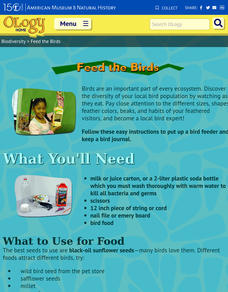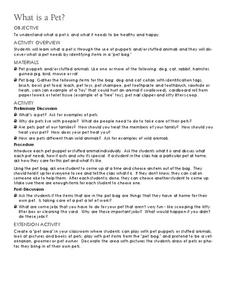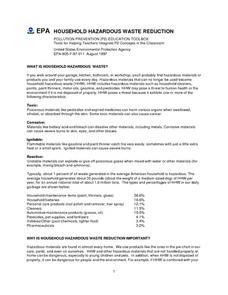Curated OER
Mohs Hardness Test
Fifth graders listen as they are told about another way to classify rocks; by their hardness. They observe the Mohs Hardness Test overhead, discover how the test works, and then use materials such as pennies, butter knives, nails, and...
Curated OER
Stargazing Astronomy: A Ceiling Full of Stars
Students make an observe a planetarium using a can with nail holes, black paper and a flashlight.
Curated OER
Moh's Hardness Test
Young geologists utilize Moh's hardness scale to help them correctly sort and classify different types of rocks. This lesson has everything you need, including an excellent example of the Mohs' Hardness Test, to successfully implement...
Curated OER
Displacement Reactions
Five metal samples are tested for their reactivity with different solutions. From the results they discover the order of reactivity for copper, iron, lead, magnesium, and zinc. Have your aspiring chemists perform this laborabory exercise...
Curated OER
What a Hard Test!
Fifth graders complete an exercise that introduces them to Moh's scale of mineral hardness. The scale is presented on the activity, and learners answer three questions which have them assign a hardness rating based on some clues. For any...
Curated OER
Are Beds Made of Balsa Wood?
Here is an interesting resource which describes different kinds of wood and their uses. There is a table with six different types of furniture wood listed, and the number of worm holes found in each one. Based on the information in the...
DiscoverE
Make a Light Bulb
Could you reinvent the light bulb? Scholars tap into their inner Thomas Edisons to build a light bulb prototype out of a jar and some wires. They see how long the filament wire glows in the jar (batteries not included) to measure their...
NOAA
Motion from the Ocean
Create a fish mobile using cardboard and string to hang in the classroom while studying ocean life. Each printable requires pupils to cut out two of the same fish to create consistency on the front and back.
DiscoverE
Building Begins with a Beam
A sturdy beam made of foam seems like an oxymoron. Scholars design a 48-inch beam that can hold a one-pound weight. The beam should be sturdy enough so it doesn't bend too much. If it does, the egg placed underneath the beam will break.
NOAA
Why is Hawaii's Ocean Important?
Studying the oceans? Focus on Hawaii's ocean with a resource packed with activity-based worksheets. Everything from products that come from the ocean to the abundance of plants and animals that call the ocean their home, Hawaii's ocean...
American Museum of Natural History
Feed the Birds
What kinds of birds are common in the area? Young scientists use household supplies to create bird feeders. They then document the birds that come to their feeders by keeping journals.
American Museum of Natural History
Feed the Birds
Scholars use a large carton, string, an emery board, and bird food to create a hand-made bird feeder. After completing the craft, pupils keep a journal to track their observations.
Curated OER
SIZING UP SOL
Ninth graders produce a projected, pinhole image of the sun and from measurement of the image and projection distance, calculate the actual size of the sun. They estimate the sun's apparent brightness from different planet.
Curated OER
Physical Science- Sink or Float?
Learners investigate which objects sink and which ones float. Learners engage in an experiment, make predictions, and record results on a graphic organizer. This is a comprehensive and easy to follow resource.
Curated OER
Let it Rain
In this home activity instructional activity, 3rd graders will focus on precipitation. Students will make a rain gauge and respond to 2 short answer questions about what they have observed.
Curated OER
What is a Pet?
Students define what a pet is and what it needs to be healthy and happy. They explore pets through the use of of puppets and/or stuffed animals and discover what a pet needs by identifying items in a "pet bag."
Curated OER
Observing Decomposition
In this science worksheet, students focus upon the concept of decomposition and collect data in order to make interpretations or observations.
Curated OER
Build Your Own Sling Psychrometer
Young scholars construct a sling psychrometer and they measure the relative amount of humidity in the air. They create their own experiment on how to construct a sling psychrometer and how they are going to measure the relative humidity...
Curated OER
Household Hazardous Waste Reduction
Students discover the different types of hazardous waste. They examine ways to dispose of the hazardous materials safely and without harming the environment.
Curated OER
Mineral Identification
In this mineral identification lesson plan, students analyze 14 minerals and test their physical properties. They test the color, luster, streak, hardness and breakage of each mineral. Students answer 5 questions about the physical...
Curated OER
Hurricane Stories
In this earth science worksheet, middle schoolers read 4 stories about hurricanes. They write short answers to 2 questions following each of the stories.
Curated OER
Conductivity Lessons
"Conduct" some simple experiments with these great lesson plans on conductors and insulators!
Curated OER
Check Out Lights and Shields with Beads
Students explore Ultraviolet detecting beads and conduct several investigations with them. In this investigative lesson plan students participate in an experiment to see the harmful effects of UV light and discuss their findings.
Curated OER
Build a battery holder
In this battery holder worksheet, students follow directions on how to use a toilet paper tube, foil, wires, and more to build a battery holder. Students follow 8 sets of directions.

























